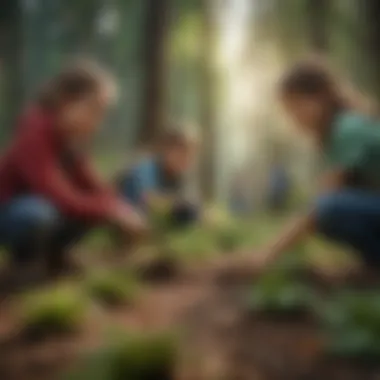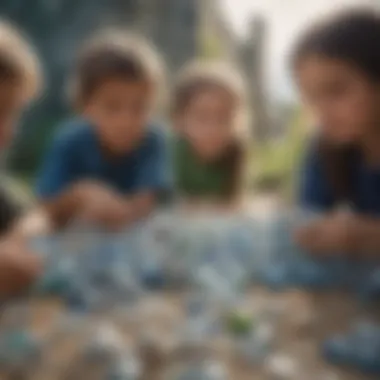Nurturing Eco-Conscious Minds: Earth Day's Impact on Kids' Environmental Awareness


Nature Topic Overview
Earth Day is a significant event that aims to raise awareness about nature conservation and environmental protection. Children have a vital role in understanding and preserving our planet for future generations. This article explores the importance of Earth Day for kids, highlighting the essential role it plays in shaping environmentally-conscious individuals. Through engaging content and interactive learning experiences, children can immerse themselves in the wonders of nature while imbibing valuable lessons on sustainability and eco-friendly practices.
Fun Facts and Trivia
Introducing fun facts and trivia about Earth Day can captivate the interest of young readers. Did you know that Earth Day is celebrated annually on April 22nd to demonstrate support for environmental protection? Visual aids such as images of diverse ecosystems and interactive elements like quizzes can enhance children's learning experiences, making the topic more accessible and engaging. By incorporating interesting facts about environmental conservation, children can develop a deeper appreciation for the natural world around them.
Wildlife Explorations
Exploring wildlife diversity is crucial in fostering a connection between children and nature. Delving into different species related to Earth Day, such as endangered animals or indigenous plants, can broaden kids' understanding of ecosystems. By providing interesting facts about these species and their habitats, children can grasp the importance of preserving biodiversity. Interactive features like wildlife-themed puzzles or quizzes can encourage children to actively engage with the topic, promoting a sense of conservation awareness in a fun and educational manner.
Environmental Awareness
Raising environmental awareness among children is essential for instilling a sense of responsibility towards the planet. Teaching youngsters about the importance of conservation and sustainability in relation to Earth Day can empower them to make eco-conscious choices. Providing practical tips on how children can contribute to protecting nature, such as recycling, conserving water, or planting trees, can inspire them to become environmental stewards. By highlighting the significance of environmental preservation, kids can develop a sense of empathy and connection with the natural environment.
DIY Nature Activities
Engaging children in hands-on nature activities can supplement their learning and encourage environmental stewardship. Offering DIY projects and experiments related to Earth Day, such as creating recycled crafts or starting a mini herb garden, can be both educational and entertaining. Step-by-step guides on crafting nature-inspired art pieces or conducting outdoor explorations enable children to apply their knowledge in practical ways. By encouraging kids to connect with nature through creative and interactive activities, we nurture their love for the environment and empower them to make a positive impact on the world.
Introduction
Earth Day holds immense significance in shaping the environmental consciousness of children. This article delves deep into the pivotal role Earth Day plays in nurturing a sense of environmental responsibility and conservation awareness among the young generation. The essence of Earth Day lies in instilling crucial values of sustainability and eco-conscious practices early on. By immersing children in engaging content and interactive learning experiences centered around Earth Day, we pave the way for a brighter future where environmental stewardship is prioritized.
What is Earth Day?


Earth Day, celebrated globally on April 22nd each year, is a day dedicated to raising awareness about environmental issues and promoting sustainability. It serves as a reminder of the urgent need to protect our planet and its natural resources for future generations. Earth Day activities often include tree planting, clean-up campaigns, recycling initiatives, and educational programs focused on climate change, biodiversity, and conservation. It is a day to inspire individuals, communities, and nations to take action towards a greener, more sustainable future.
History of Earth Day
In this article focused on the significance of Earth Day for children, understanding the history of Earth Day becomes paramount. The roots of Earth Day can be traced back to the environmental movement of the 1960s when concerns about pollution and environmental degradation were gaining momentum. It was a time of increasing awareness about the impact of human activities on the planet. Earth Day, first celebrated on April 22, 1970, marked a turning point in the environmental consciousness of the nation. The day aimed to draw attention to pressing environmental issues and advocate for sustainable practices in a time of industrial expansion. Exploring the history of Earth Day provides a foundational understanding of the values and principles underlying the modern environmental movement.
Origins of Earth Day
Delving into the origins of Earth Day unveils the grassroots efforts led by Senator Gaylord Nelson and activist Denis Hayes. Senator Nelson was inspired to mobilize the public with a nationwide demonstration in honor of the Earth's well-being. This led to the organization of the first Earth Day, which saw an astonishing 20 million Americans participating in rallies, teach-ins, and clean-up activities. The passion and dedication displayed on that day sparked the creation of the Environmental Protection Agency (EPA) and the passage of environmental legislation like the Clean Air Act and the Clean Water Act. Understanding the origins of Earth Day illuminates the power of collective action and the potential for driving meaningful change through advocacy and community engagement.
Significance of April 22nd
The relevance of April 22nd in the realm of environmental conservation cannot be overstated. April 22nd serves as a symbolic reminder of the ongoing need to prioritize sustainability and environmental stewardship. It is a day to reflect on the progress made in environmental protection and to renew commitments towards a greener future. The choice of April 22nd for Earth Day was intentional, as it falls during a time of year when nature begins to awaken from its winter slumber. The date symbolizes rebirth, growth, and the cyclical nature of life on Earth. Recognizing the significance of April 22nd serves as a call to action for individuals, communities, and nations to uphold their responsibility in preserving the planet for future generations.
Environmental Education for Kids
Environmental education for kids is a critical component of shaping the future generation as environmentally conscious individuals. It serves as the foundation for instilling values of sustainability, conservation, and eco-responsibility in young minds. In this article, we delve deep into the core aspects of environmental education tailored for children between the ages of 5-12 years. Through a comprehensive approach that integrates various learning modalities, we aim to equip children with the necessary knowledge and skills to become proactive stewards of the environment.
Importance of Environmental Education
The importance of environmental education lies in its ability to foster a deep connection between children and nature. By providing kids with opportunities to explore and understand the natural world, we empower them to develop a profound sense of respect and appreciation for the environment. Moreover, environmental education emphasizes the interdependence between humans and nature, encouraging children to recognize their role in preserving the planet for future generations. Through structured educational initiatives, we can cultivate a generation of environmentally aware individuals who are committed to making sustainable choices in their daily lives.
Benefits of Teaching Kids about Nature
Teaching kids about nature offers a myriad of benefits that extend beyond academic learning. It not only enhances their cognitive abilities but also promotes emotional well-being and physical health. By immersing children in nature-based activities, we can stimulate their creativity, curiosity, and problem-solving skills. Additionally, exposure to nature has been shown to reduce stress, improve concentration, and foster a sense of environmental stewardship. Through firsthand experiences and meaningful interactions with the natural world, children can develop a deeper understanding of ecological systems and the importance of biodiversity conservation.


Engaging Ways to Educate Children on Environmental Issues
Engaging children in environmental issues requires creativity and innovation to capture their interest and inspire action. Utilizing interactive learning tools, such as games, experiments, and outdoor activities, we can make complex environmental concepts accessible and engaging for young learners. Hands-on experiences, virtual field trips, and nature walks are effective methods to immerse children in environmental learning while promoting a sense of wonder and curiosity. By presenting information in relatable and interactive formats, we can encourage children to think critically about environmental challenges and empower them to become active agents of positive change in their communities.
Interactive Learning Experiences
In the context of educating the next generation of environmental stewards, interactive learning experiences hold a crucial role. These experiences encompass a hands-on approach that allows children to actively engage with environmental concepts, fostering a deeper understanding and appreciation for nature. By immersing kids in practical activities, interactive learning experiences not only educate but also instill a sense of responsibility and curiosity towards the environment. The tactile nature of these activities stimulates multiple senses, enhancing the learning process and making it more memorable for young learners. Drawing connections between theoretical knowledge and real-world applications, interactive learning experiences create lasting impressions that can shape children's environmental consciousness throughout their lives.
Nature Walks and Outdoor Activities
Nature walks and outdoor activities serve as invaluable tools for connecting children with the natural world. These experiences enable kids to explore diverse ecosystems, observe flora and fauna up close, and develop a firsthand understanding of environmental interdependence. Through nature walks, children can witness ecological processes in action, such as photosynthesis or natural habitats, sparking curiosity and a sense of wonder. Engaging in outdoor activities like gardening, birdwatching, or hiking not only promotes physical health but also cultivates a deep-seated respect for nature's beauty and complexity. By immersing in outdoor settings, children can develop a profound connection with the environment, nurturing a sense of stewardship and conservation ethics from a young age.
Hands-On Science Projects
Hands-on science projects offer children a practical avenue to explore environmental principles and sustainability concepts. By involving kids in experiments, such as constructing a mini compost bin or testing water quality, they can witness these concepts in action, fostering experiential learning. Through hands-on projects, children learn problem-solving skills, critical thinking, and scientific inquiry, essential for comprehending environmental issues. These projects not only spark creativity and curiosity but also empower children to become active participants in environmental conservation efforts. By engaging in tangible experiments, kids develop a sense of achievement and agency, instilling a lifelong passion for preserving the planet and promoting sustainable practices.
Virtual Field Trips to Eco-Destinations
Virtual field trips to eco-destinations offer a unique opportunity for children to explore environmentally significant sites across the globe from the comfort of their classrooms or homes. Through virtual reality technology or immersive videos, kids can visit national parks, marine sanctuaries, or conservation centers, expanding their environmental awareness beyond local surroundings. These virtual experiences provide children with a window to biodiversity hotspots, environmental challenges, and conservation initiatives happening worldwide. By virtually touring eco-destinations, kids can gain insights into global environmental issues, fostering a sense of interconnectedness and shared responsibility towards the planet. Virtual field trips enhance geographical knowledge, cultural awareness, and environmental empathy, preparing children to become informed and proactive stewards of our precious Earth.
Celebrating Earth Day
In the context of educating children about environmental stewardship, celebrating Earth Day holds significant importance. Earth Day serves as a pivotal moment to instill in young minds the values of conservation and sustainability. By commemorating Earth Day, children are offered a platform to actively engage with the concepts of environmental responsibility and awareness. It allows them to connect with nature on a deeper level and appreciate the importance of preserving our planet for future generations. Through various eco-friendly activities and initiatives, celebrating Earth Day can spark a sense of curiosity and passion for the environment among children.
Ideas for Eco-Friendly Activities


When considering eco-friendly activities for Earth Day, there is a myriad of creative options available to engage children in sustainable practices. Encouraging activities such as planting trees, organizing clean-up drives, or creating recycled art projects can help children develop a hands-on understanding of environmental conservation. These activities not only promote a sense of environmental responsibility but also foster teamwork and community spirit among participants. Additionally, engaging in eco-friendly activities can inspire children to become ambassadors for positive environmental change within their families and communities.
Creating Nature-Inspired Art
One enriching way to celebrate Earth Day with children is through creating nature-inspired art. Encouraging kids to artistically express their connection to the environment not only nurtures their creativity but also deepens their appreciation for the beauty of nature. Art projects using natural materials like leaves, twigs, and flowers not only promote sustainability but also serve as a tangible representation of children's love for the planet. Through art, children can communicate their feelings towards the environment and showcase their commitment to preserving Earth's natural wonders.
Promoting Recycling and Waste Reduction
Promoting recycling and waste reduction during Earth Day activities can have a lasting impact on children's environmental consciousness. By incorporating practices such as waste segregation, composting, and upcycling, kids can understand the importance of waste management and its implications on the ecosystem. Learning about the 3 R's - reduce, reuse, recycle - can empower children to make informed choices that contribute to a healthier planet. Through such initiatives, children not only learn practical skills but also internalize the values of sustainability and responsible consumption.
Fostering a Love for Nature
In the context of educating the next generation of environmental stewards, fostering a love for nature stands as a foundational element. Encouraging children to develop a strong connection with the natural world is paramount in instilling values of conservation and sustainability from a young age. By nurturing this bond with nature, kids are more likely to grow into adults who prioritize environmental stewardship and understand the interconnectedness of all living beings.
Fostering a love for nature offers a myriad of benefits for children. It enhances their cognitive development, promotes physical well-being, and cultivates empathy and respect for the environment and its inhabitants. Additionally, connecting with nature can help reduce stress, increase creativity, and foster a sense of curiosity and wonder in young minds. These experiences lay the foundation for a lifelong commitment to preserving the planet and making eco-conscious choices.
When considering how to foster a love for nature in children, it is essential to create opportunities for hands-on exploration and outdoor activities. Encouraging kids to spend time in nature, whether through gardening, nature walks, or wildlife observation, allows them to develop a personal connection to the environment. Moreover, exposing children to diverse natural environments helps broaden their understanding of ecological systems and biodiversity, nurturing a sense of appreciation for the Earth's beauty and complexity.
Connecting Children with the Outdoors
Delving deeper into the importance of connecting children with the outdoors, this section underscores the significance of direct engagement with the natural world. Encouraging kids to venture outside and interact with their surroundings fosters a sense of curiosity, independence, and environmental awareness. By immersing themselves in outdoor experiences, children can develop a profound respect for nature and gain first-hand knowledge about ecological processes and conservation practices.
Connecting children with the outdoors is crucial for their holistic development. It promotes physical fitness, sensory stimulation, and mental well-being, while also enhancing problem-solving skills and creativity. Through outdoor play and exploration, children learn valuable lessons about resilience, adaptability, and resourcefulness, which are essential for navigating life's challenges and fostering a sense of environmental responsibility.
To facilitate meaningful connections with the outdoors, parents, teachers, and caregivers should prioritize creating safe and engaging outdoor spaces for children to explore. Provision of opportunities for unstructured play in natural settings, such as parks, forests, or gardens, enables kids to immerse themselves in imaginative learning experiences and develop a deep-seated appreciation for the beauty and diversity of the natural world.
Conclusion
Earth Day holds immense significance as a catalyst for instilling environmental awareness in children. In this article, we have explored the multifaceted importance of Earth Day for kids. By emphasizing the connection between children and nature, Earth Day serves as a pivotal platform for nurturing eco-consciousness and environmental stewardship. Through engaging content and interactive experiences, children can delve into the wonders of the natural world while imbibing crucial lessons on sustainability and conservation. This article has shed light on the imperative role Earth Day plays in shaping the mindset of the future generation towards responsible environmental practices, underscoring the profound impact it has on fostering a culture of preservation and eco-friendly behaviors.
Empowering the Next Generation of Environmental Stewards
Empowering the next generation of environmental stewards is a fundamental aspect of Earth Day initiatives. By instilling a sense of environmental responsibility and conservation ethics in children aged 5-12 years, we are nurturing future leaders equipped to tackle pressing environmental challenges. Through targeted educational programs and interactive experiences, kids learn the importance of preserving nature and adopting sustainable practices. By immersing young minds in eco-conscious activities, such as recycling projects and nature exploration, we are nurturing a generation committed to safeguarding the planet. Encouraging children to engage with their surroundings and instilling a profound respect for the environment empowers them to become advocates for sustainability. By empowering children to take actionable steps towards environmental conservation, we are sowing the seeds for a greener future built on stewardship and respect for the natural world.







